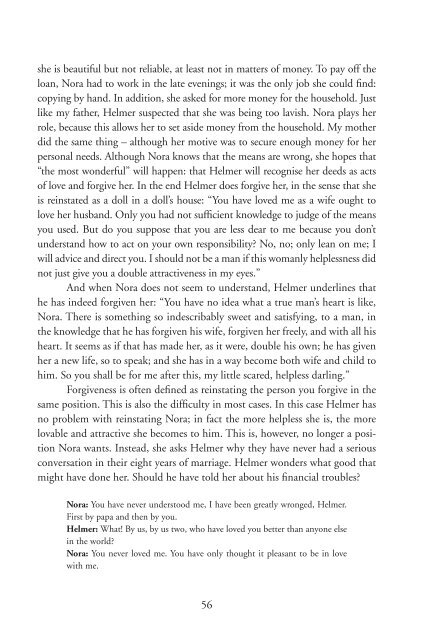Teaching Subjectivity. Travelling Selves for Feminist ... - MailChimp
Teaching Subjectivity. Travelling Selves for Feminist ... - MailChimp
Teaching Subjectivity. Travelling Selves for Feminist ... - MailChimp
Create successful ePaper yourself
Turn your PDF publications into a flip-book with our unique Google optimized e-Paper software.
she is beautiful but not reliable, at least not in matters of money. To pay off the<br />
loan, Nora had to work in the late evenings; it was the only job she could find:<br />
copying by hand. In addition, she asked <strong>for</strong> more money <strong>for</strong> the household. Just<br />
like my father, Helmer suspected that she was being too lavish. Nora plays her<br />
role, because this allows her to set aside money from the household. My mother<br />
did the same thing – although her motive was to secure enough money <strong>for</strong> her<br />
personal needs. Although Nora knows that the means are wrong, she hopes that<br />
“the most wonderful” will happen: that Helmer will recognise her deeds as acts<br />
of love and <strong>for</strong>give her. In the end Helmer does <strong>for</strong>give her, in the sense that she<br />
is reinstated as a doll in a doll’s house: “You have loved me as a wife ought to<br />
love her husband. Only you had not sufficient knowledge to judge of the means<br />
you used. But do you suppose that you are less dear to me because you don’t<br />
understand how to act on your own responsibility? No, no; only lean on me; I<br />
will advice and direct you. I should not be a man if this womanly helplessness did<br />
not just give you a double attractiveness in my eyes.”<br />
And when Nora does not seem to understand, Helmer underlines that<br />
he has indeed <strong>for</strong>given her: “You have no idea what a true man’s heart is like,<br />
Nora. There is something so indescribably sweet and satisfying, to a man, in<br />
the knowledge that he has <strong>for</strong>given his wife, <strong>for</strong>given her freely, and with all his<br />
heart. It seems as if that has made her, as it were, double his own; he has given<br />
her a new life, so to speak; and she has in a way become both wife and child to<br />
him. So you shall be <strong>for</strong> me after this, my little scared, helpless darling.”<br />
Forgiveness is often defined as reinstating the person you <strong>for</strong>give in the<br />
same position. This is also the difficulty in most cases. In this case Helmer has<br />
no problem with reinstating Nora; in fact the more helpless she is, the more<br />
lovable and attractive she becomes to him. This is, however, no longer a position<br />
Nora wants. Instead, she asks Helmer why they have never had a serious<br />
conversation in their eight years of marriage. Helmer wonders what good that<br />
might have done her. Should he have told her about his financial troubles?<br />
Nora: You have never understood me, I have been greatly wronged, Helmer.<br />
First by papa and then by you.<br />
Helmer: What! By us, by us two, who have loved you better than anyone else<br />
in the world?<br />
Nora: You never loved me. You have only thought it pleasant to be in love<br />
with me.<br />
56

















